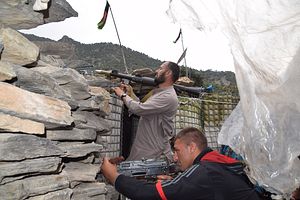WAIGAL, NURISTAN, AFGHANISTAN – Nuristan means the “Land of Light.” But the poetically promising name is fallacious as the people in the center of Nuristan’s district of Waigal have not much, if any, hope left. Almost completely surrounded by Taliban, they have their weapons always ready – especially at night, as even in the “Land of Light” darkness falls and fighters from both sides try to exploit its cover. Government forces holding the line don’t believe that the war in their valley will ever end – even if current national and international efforts should result in a peace accord. And this is only one of many such examples across the country.
The ‘Land of Light’
Tucked away in the mountains of eastern Afghanistan, Nuristan is arguably the most remote of the country’s 34 provinces. It’s so remote and difficult to access in fact that until the late 19th century Nuristan was known as Kafiristan – the “Land of the Infidels” – as its people had resisted outside control and still adhered to an ancient animist religion. This only changed in 1895, when the then-Afghan emir subdued Kafiristan, forcibly converted its inhabitants to Islam, and renamed it.
Driving up toward Waigal, one can well imagine why Nuristan had not been conquered earlier. And why – apart from some forays, including U.S. deployments to isolated outposts in the years since the toppling of the Taliban regime in 2001 – it has been mostly neglected ever since.
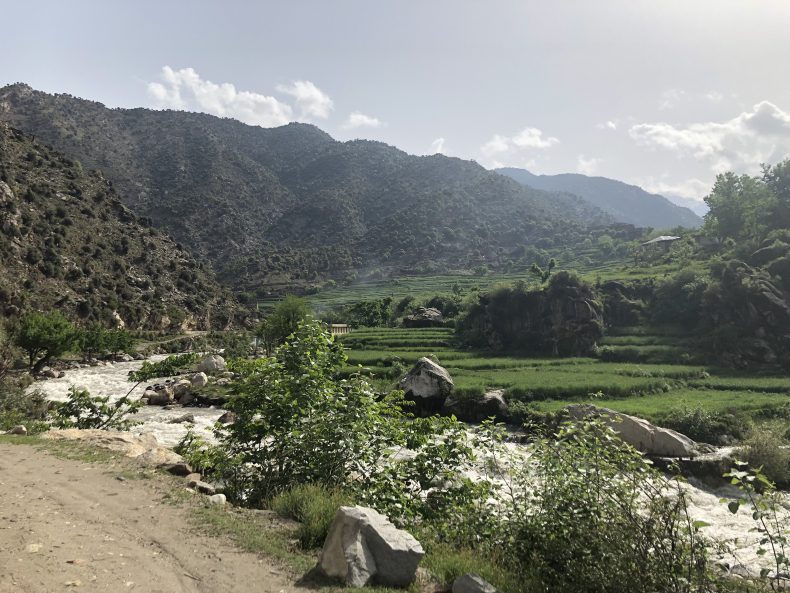
Want, the center of the district of Waigal in the eastern Afghan province of Nuristan. The Taliban reportedly use the higher ridges seen on the picture to frequently fire on Afghan government forces in and around Want. (April 25, 2019). Photo by Franz J. Marty.
While the lower valley of the Pech river, located in neighboring Kunar province and along the way to Waigal, has a floor that is wide enough to easily accommodate lush fields and a (by Afghan standards) quite comfortable road, branching off from the Pech valley toward Waigal, it just takes a few minutes’ drive until the scenery changes. The valley narrows down so much that only arduously built terraces a few meters wide are arable. The road, now unpaved and bumpy, at times clutches to craggy cliffs. Above the road, the slopes are bare rock, whose slick surfaces glisten in the sun and make one wonder where the low trees and few tufts of grass that sprinkle them find hold.
The immediate surroundings of the soon reached district centre that is officially called Want (although some locals assert that it is vice-versa, i.e. the district being named Want and the centre Waigal) are again a little more accessible with a less steep hill side covered in fields. However, the towering mountains closing in from every side are an ever present reminder of the overall harsh terrain.
Further up the splitting valleys the mountains get even higher and steeper and the road much worse, locals assert. But this is not the main difficulty that prevents most people from venturing there.
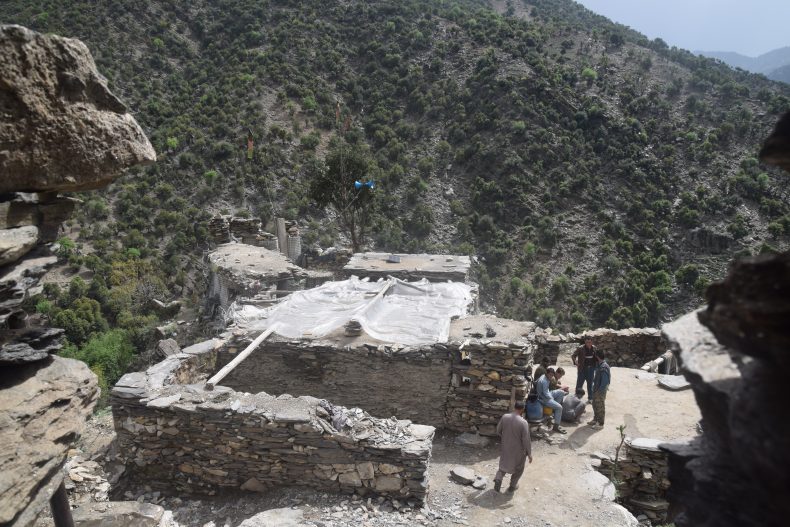
The last outpost of Afghan government forces in a side valley just above Want, the center of the district of Waigal in the eastern Afghan province of Nuristan. Everything farther up the valley is controlled by the Taliban (April 25, 2019). Photo by Franz J. Marty.
Surrounded by Taliban
The Afghan tricolor flags flying over a handful of outposts – nothing more than rudimentary stone huts, perched on outcrops in the slopes just over the district center – are as far as the Afghan government’s control reaches in Waigal. “Further up, all is full of Taliban. During the past days and weeks they even took all the mountain ridges around us,” Abdul Boki, a Waigali policemen, whose simple house lies right at the bank of the rushing river, said in late April.
The dull sound of an explosion later in the afternoon and the faint smoke cloud caused by it, rising over a ridge in direct line of sight from the porch of Boki’s house, corroborated his assertion. “We sometimes shoot an RPG at them to try to keep the Taliban off the ridge,” Boki explained, nonchalantly referring to a shoulder launched grenade. As not only Boki but also his little children did not even flinch at the sound, the odd shot every now and then – be it from the Taliban or Afghan government forces – is apparently indeed more or less part of a normal day in Waigal.
Boki as well as other locals put the number of armed Taliban fighters in their district at 1,000 to 1,500. These are rough estimates at best and might well be exaggerated – all the more as it would be hard to see how the 250 men of the Afghan National and Afghan Local Police in Waigal would be able to hold such a superior force at bay. In any event, all sources in Waigal agree that almost all Taliban in their district are locals.
Asked why so many Waigalis join the Taliban, no one has a clear answer; many even none at all. One local government official blamed the Pakistani Inter-Services Intelligence for cajoling locals with false narratives of a holy war against infidels. This, however, as so often across Afghanistan, seemed to be rather a conspiracy theory than a fact-based conclusion.
An officer in the Afghan National Army, who hails from the last reaches of Waigal, also mentioned sinister Pakistani influence, but only as one among several reasons. Some locals would join the Taliban due to personal animosities with people linked to the government or because they – as the government has never been present in remote areas – have to choose between the Taliban and complete lawlessness, the officer said. Poverty and the lack of employment would also play into it, he added.
Although not explicitly mentioned by locals, another apparently significant motive for the Taliban affiliation of many Waigalis is a religious conviction. Despite only a few generations ago having been “infidels,” many Waigalis are now zealous Islamist fanatics. This was confirmed by one insurgent from Nangarhar, who had some years ago for a prolonged period lived among local militants in Nuristan. “They have all an al-Qaeda mindset,” he said, using this description to point out that the Nuristani Taliban adhere to much more extreme jihadi views than other Taliban rather than to imply that they are actually al-Qaeda members.
Whether or to what extent this has been further fueled by fears of modern intrusions into their remote valleys is hard to tell. The fact that quite a number of the pro-government Waigalis in the district center seem to be into Western fashion, amongst others stylish sunglasses, and proudly recount their previous collaboration with U.S. forces may be a hint, though, that such fears – whether justified or not – exist among some Waigalis. This is certainly not a fight against outsiders, though, as virtually everyone on the government side in Waigal – from the police chief and district governor to the men holding the last outposts – is from Waigal.
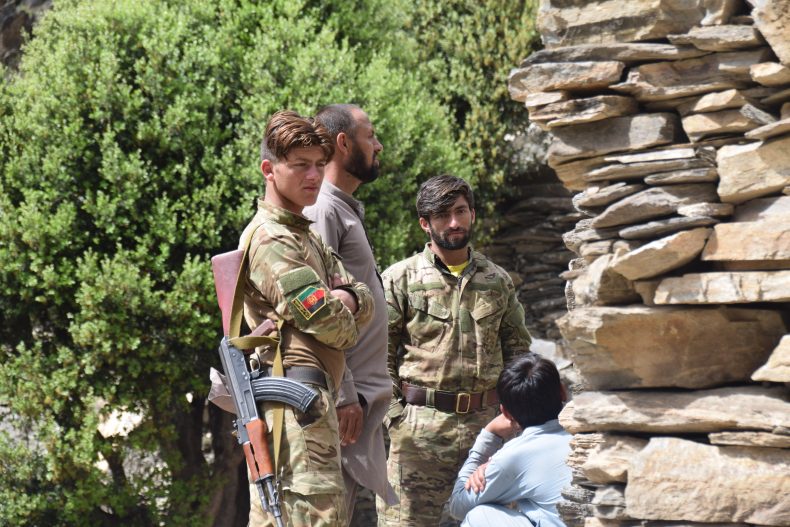
Waigali policemen in the last outpost of Afghan government forces in a side valley just above the center of the district of Waigal, Nuristan (April 25, 2019). Photo by Franz J. Marty.
Guerrilla Warfare on Both Sides
Whatever their reasons are, the Waigali Taliban are dedicated to fighting their pro-government fellow Waigalis. “Every day, our outpost comes under Taliban fire,” asserted Enayatullah, a young policeman who – with 17 colleagues – holds a desolate outpost in a side valley just above the district center. “Sometimes the Taliban use Dragunov [sniper rifles], sometimes small or heavy machine guns,” he specified. On the day of this author’s visit to the outpost, the bullet of a Taliban sniper had allegedly hit the reinforced wooden roof of their living quarter, only cracking, but not penetrating it. And a dent in one of the outer HESCO barriers was reportedly caused by an incoming RPG some time ago.
“They fire on us from everywhere in the surrounding mountains; taking some random position, shooting and right afterwards often disappearing,” Enayatullah added. Other sources also stated the Taliban do not use any permanent positions or fortified outposts, apparently to prevent becoming a target.
While the use of such guerrilla techniques by the Taliban does not come as a surprise, in Waigal the usually more conventionally operating Afghan government forces also resort to similar tactics. “Every night, we lay ambushes in changing spots at the mountain sides, lurking in the darkness, weapons at the ready,” Boki said. “This way we prevent the Taliban from sneaking down into the district center under cover of night.”
“Yesterday night, we killed one Talib and wounded another one in such an ambush,” Enayatullah alleged on April 25, “and this happens more or less every night.” Such claims of success could not be independently verified. However, at least in the past the Taliban reportedly at times managed to get down to the district center, as Boki had earlier pointed out a spot on a sleepy path where three of his colleagues had been killed by an improvised explosive device. The only sign that still reminded of the long-ago incident were three simple pieces of cloth that are – in commemoration of the fallen – tied to the branches of three separate trees in the vicinity.
Yet the locals let me move around freely and even in the mentioned outpost only half-heartedly warned me to not stay too long out of cover. This suggests that Taliban fire and improvised explosive devices are not as dangerous as some of the policemen’s statements implied.
This is not to say that the Taliban don’t pose a serious threat to Waigal’s district center, though. Waigalis recounted that their district had several times fallen to the Taliban in the past, the last time in 2016. And there have been some close calls since then, with the next one maybe around the corner, as the Taliban reportedly intensified their fire on the district center in the days following my visit before being pushed back again.
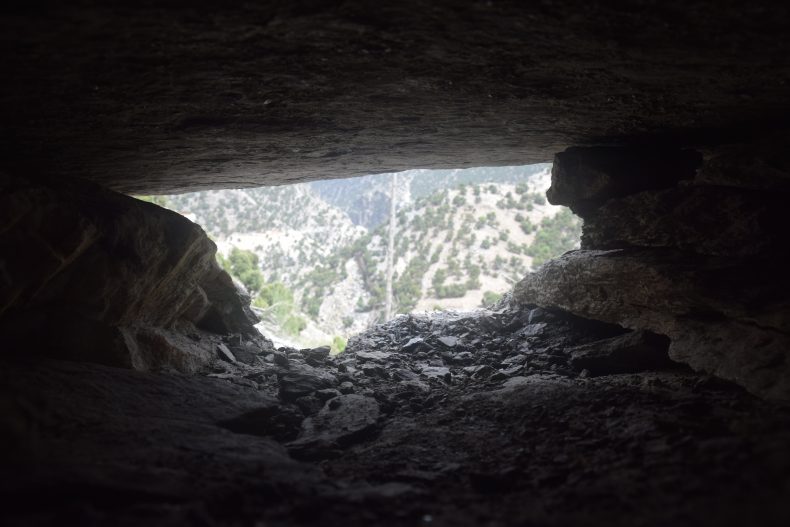
The view from the last government outpost into Taliban territory. Photo by Franz J. Marty.
Never-Ending Feuds?
In any event, the conflict in Waigal has become so entrenched that the Waigali policemen are convinced that it will go on forever. “The war here will never end. Even if the Taliban, the United States of America, and the Afghan government should reach a peace agreement, the fight in Waigal would just go on,” Boki asserted when asked what he thinks of peace efforts such as the ongoing U.S.–Taliban talks. Enayatullah as well as his colleagues in the outpost concurred.
Asked why this would be the case, they refer to deep-rooted personal enmity. “Almost every one of us has lost someone – a father or a brother or someone else – all killed by the Taliban,” Enayatullah explained. “The Taliban have once torched my house and I have lost everything,” Boki mentioned another grievance. “I will never forgive them and fight them forever.”
In a rare glimpse of empathy with his adversaries, Boki then added that it is similar on the other side: “Some of us [government forces] have done the same [i.e. destroying houses] to the Taliban and that’s why also they won’t stop and the war will never end.”
Who initiated these vicious cycles of violence and when is impossible to determine. Given that in the “notoriously clannish, fragmented and revenge-driven environment” of Nuristan feuds have been documented since at least the time when it was still known as Kafiristan, such enmity might date back decades and merely be continuing in the guise of the current Taliban–government conflict.
This unforgiving hatred between the warring parties is not limited to Waigal. “Such cases exist in areas in almost all provinces,” Ehsanullah Ehsan, an Afghan researcher and journalist, stated. Among several examples, he mentioned that in some areas of the northern province of Kunduz the killing of countless people on both sides has led also locals there to see the conflict more as a revenge-driven personal matter than an ideological war between the Taliban and the Afghan government. This was, according to Ehsan, openly acknowledged by commanders from both sides in Kunduz.
This obviously poses a significant potential spoiler to any peace efforts – no matter in which format and venue. This was also echoed by remarks of the U.S. Special Inspector General for Afghanistan Reconstruction (SIGAR) pointing out that “[a]ny political [peace] settlement entails the risk that not all subordinate groups will abide by an agreement made by their organization’s leadership. Therefore, insecurity could potentially persist (…).”
Whether or how such extreme hostile attitudes can be overcome is unclear. One way might be via the mediation of civilians that know both sides – the government and the Taliban. Such civilians do exist, including in Waigal. One old man with a long white beard and a weathered face who has lost one eye frequently goes back and forth from his house further up the valley in Taliban territory to the district center, among other reasons for shopping, as there is no bazaar in the upper parts of Waigal. Similarly, but more peculiarly, another man with clear blue eyes and a neatly trimmed white beard, who works in the education department of Waigal, also lives in a Taliban-held area.
“Going back and forth from the Taliban to the government side is possible,” both stated in separate conversations. Although they don’t say so, this might be partly due to their old age. At least according to the above-mentioned Afghan National Army officer from Waigal, who hasn’t been able to go to his birthplace for years, the Taliban would only harass and target (potentially) government-linked younger people, but more or less leave alone the elderly, even if they had some indirect connection to the government. Confirming this, several policemen in Waigal stated that their parents are living in Taliban-held areas, but are not or at least not significantly bothered by the Taliban.
This does not mean, though, that it is easy for the old men or others like them. “Of course it is difficult,” the education official said. “There [in Taliban areas], they accuse me of being a brother of the government and here in the district center they ask me, what I am doing living in a Taliban area,” he explained. “They always suspect me, with either side accusing me of belonging to the other,” the one-eyed man said, expressing the same sentiment. Accordingly, they seem to try their best to get involved as little as possible. But even if they or others like them should be willing to change that and mediate, the existing suspicions and accusations would draw the chances of success into question.
While this impasse might be somehow overcome at some point in time, at least for now the Waigalis are right — the war in this remote valley will not end any time soon.
Franz J. Marty is a freelance journalist based in Afghanistan. He writes on a broad range of topics, but focuses on security and military issues. You can follow him @franzjmarty on Twitter.













